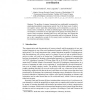Free Online Productivity Tools
i2Speak
i2Symbol
i2OCR
iTex2Img
iWeb2Print
iWeb2Shot
i2Type
iPdf2Split
iPdf2Merge
i2Bopomofo
i2Arabic
i2Style
i2Image
i2PDF
iLatex2Rtf
Sci2ools
ICANN
2003
Springer
2003
Springer
Dimensionality Reduction through Sensory-Motor Coordination
The problem of category learning has been traditionally investigated by employing disembodied categorization models. One of the basic tenets of embodied cognitive science states that categorization can be interpreted as a process of sensory-motor coordination, in which an embodied agent, while interacting with its environment, can structure its own input space for the purpose of learning about categories. Many researchers, including John Dewey and Jean Piaget, have argued that sensory-motor coordination is crucial for perception and for development. In this paper we give a quantitative account of why sensory-motor coordination is important for perception and category learning.
| Added | 06 Jul 2010 |
| Updated | 06 Jul 2010 |
| Type | Conference |
| Year | 2003 |
| Where | ICANN |
| Authors | I. René J. A. te Boekhorst, Max Lungarella, Rolf Pfeifer |
Comments (0)

